One of the planned activities within the framework of the project “Ice Operations” funded by the Kolarctic programme is an Arctic expedition on the research vessel “Professor Molchanov”, organized by the Northern Arctic Federal University (Arkhangelsk, Russia).
One of the goals of this complex expedition is to study the Arctic ice. The Barents Sea is the main non-freezing sea in the Arctic Basin, so it is important to monitor the movement of ice to ensure the safe passage of ships. In addition to ships, there are offshore oil and gas platforms, which can be damaged by ice.
Dmitry Kovalev is a leading engineer at the Higher School of Information Technologies and Automated Systems (NArFU) and one of the expedition members. His task during expedition was compilation of ice maps. The data collected during field work at sea is extremely important for assessing and forecasting ice conditions. Field studies and observations help to estimate ice thickness, its age, structure and direction of movement. Upon arrival, the project participants will conduct validation: compare the data obtained during the expedition with available satellite images. Databases from satellites cannot provide comprehensive information about current ice situation, they need to be supplemented with information obtained during field work: “We had data from available satellite images, according to them we expected to see the ice in the north and northeast, but we met it in the north west. Moreover, icebergs are not always visible on satellite images, – reports Dmitry Kovalev. – Before the expedition start it was doubtful that we can discover ice in the Barents Sea at this time of the year. However, we ended up in ice fields. Icebergs were rarely seen here before, but due to global warming their number has increased. We saw a rather large iceberg; it was even larger than our ship.”
An integrated approach and participation of specialists from the entire Barents region are needed to make ice situation analysis and develop more accurate models and forecasts. The joint work of the project participants from Russia, Finland, Norway and Sweden will be continued at working meeting in Arkhangelsk on August 20-21, 2019, where the expedition results will be presented and further project activities planned.
More information about expedition can be found on the website of the Northern Arctic Federal University: https://narfu.ru/en/research/expeditions/fu/

Photo: Northern (Arctic) Federal University
